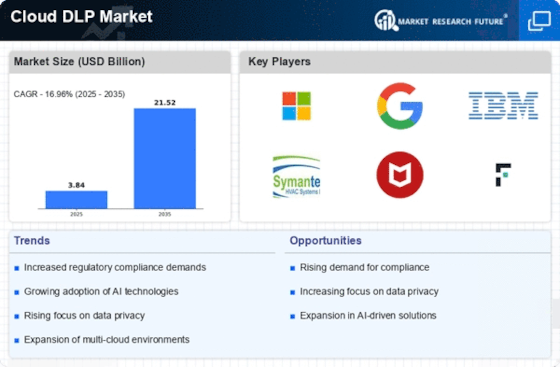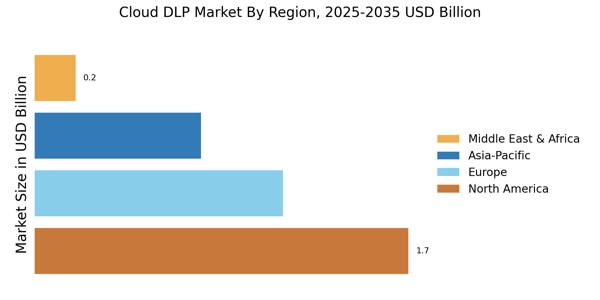Rise of Remote Work
The rise of remote work has transformed the way organizations manage their data, significantly impacting the Cloud DLP Market. As employees increasingly work from various locations, the need for secure access to sensitive information has become paramount. This shift has led to a greater emphasis on data protection measures, as organizations seek to prevent unauthorized access and data leaks. The Cloud DLP Market is witnessing a surge in demand for solutions that enable secure data sharing and collaboration among remote teams. Companies are investing in technologies that provide visibility and control over data usage, ensuring that sensitive information remains protected regardless of the user's location. This trend highlights the evolving nature of work and the corresponding need for robust data loss prevention strategies in the Cloud DLP Market.
Increased Data Breaches
The rise in data breaches has become a critical concern for organizations, driving the demand for solutions in the Cloud DLP Market. As cyber threats evolve, companies are increasingly aware of the need to protect sensitive information stored in cloud environments. Reports indicate that the number of data breaches has surged, with millions of records compromised annually. This alarming trend compels businesses to invest in robust data loss prevention strategies to safeguard their assets. Consequently, the Cloud DLP Market is witnessing heightened interest from enterprises seeking to mitigate risks associated with data exposure. The urgency to comply with data protection regulations further amplifies this demand, as organizations strive to avoid hefty fines and reputational damage. Thus, the increasing frequency of data breaches serves as a significant driver for the Cloud DLP Market.
Emergence of Advanced Technologies
The emergence of advanced technologies, such as artificial intelligence and machine learning, is reshaping the Cloud DLP Market. These technologies offer enhanced capabilities for identifying and mitigating data loss risks, enabling organizations to proactively protect their sensitive information. AI-driven solutions can analyze vast amounts of data in real-time, detecting anomalies and potential threats with greater accuracy. This technological advancement is likely to drive the adoption of Cloud DLP Market solutions, as organizations seek to leverage these innovations to bolster their data protection strategies. The Cloud DLP Market is poised for growth as businesses recognize the value of integrating advanced technologies into their data loss prevention efforts. The potential for improved efficiency and effectiveness in safeguarding sensitive information positions the Cloud DLP Market favorably in the evolving landscape of data security.
Growing Adoption of Cloud Services
The accelerated adoption of cloud services across various sectors is a pivotal driver for the Cloud DLP Market. Organizations are increasingly migrating their operations to the cloud to enhance efficiency and reduce costs. According to recent statistics, the cloud services market is projected to grow substantially, with a significant percentage of businesses expected to rely on cloud solutions for their data management needs. This shift necessitates the implementation of effective data loss prevention measures to protect sensitive information in cloud environments. As more companies embrace cloud technologies, the demand for Cloud DLP Market solutions is likely to rise, as organizations seek to ensure the security and integrity of their data. The Cloud DLP Market is thus positioned to benefit from this trend, as businesses prioritize data protection in their cloud strategies.
Regulatory Compliance Requirements
The increasing complexity of regulatory compliance requirements is a major driver for the Cloud DLP Market. Organizations are facing stringent regulations regarding data protection and privacy, such as GDPR and CCPA, which mandate the safeguarding of sensitive information. Compliance with these regulations is not only essential for avoiding legal repercussions but also for maintaining customer trust. As a result, businesses are compelled to adopt comprehensive data loss prevention solutions to ensure adherence to these regulations. The Cloud DLP Market is experiencing growth as organizations seek to implement effective strategies that align with compliance mandates. The need for continuous monitoring and reporting further emphasizes the importance of Cloud DLP Market solutions in helping organizations navigate the intricate landscape of regulatory requirements. This trend indicates a sustained demand for Cloud DLP Market technologies in the foreseeable future.

















